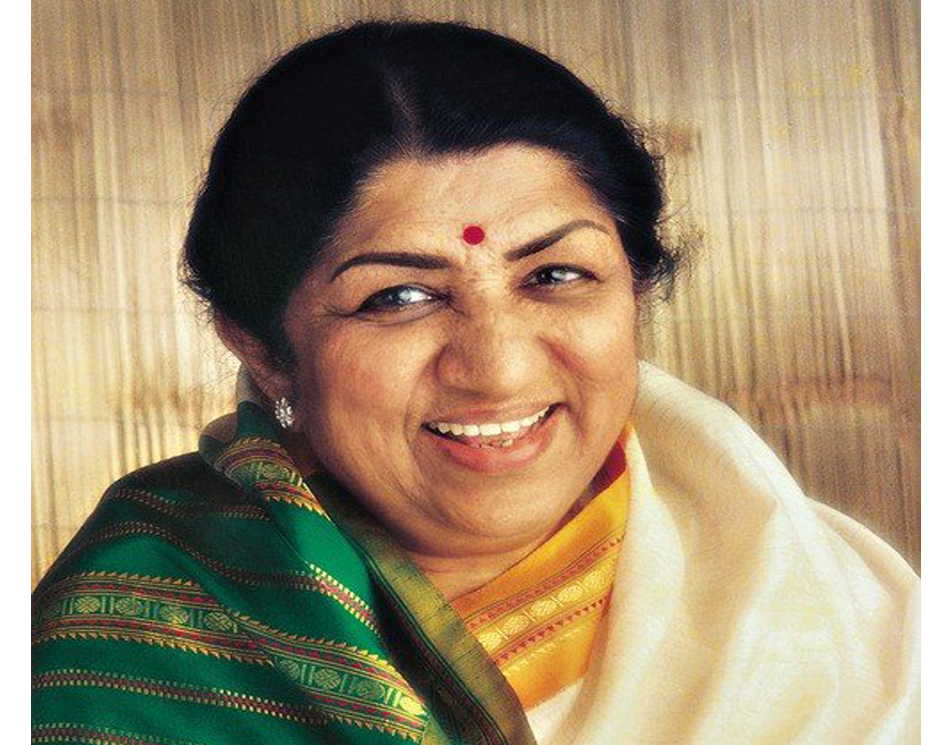Lata Mangeshkar is an Indian playback singer and occasional music composer. She is the best-known and most respected playback singer in India. She is referred to as the Nightingale of India and the Queen of Melody. Mangeshkar’s career started in 1942 and has spanned over seven decades. She has recorded songs for over a thousand Hindi films and has sung songs in over thirty-six regional Indian languages and foreign languages, though primarily in Marathi and Hindi.
She is also the second vocalist, after M. S. Subbulakshmi, to have ever been awarded the Bharat Ratna in 2001, India’s highest civilian honour.
She was the first Indian to perform in Royal Albert Hall in 1974. She was conferred France’s highest civilian award (Officer of the Legion of Honour) in 2007. Due to all of her achievements, many singers and musicians consider her to be one of the greatest female singers in the Hindi film industry.
Lata Mangeshkar was born in a Marathi-speaking Gomantak Maratha family, in the princely state of Indore, part of the Central India Agency (now part of Madhya Pradesh). Her father, Pandit Deenanath Mangeshkar, was a classical singer and theatre actor. Her mother Shevanti (Shudhamati) who was from Thalner, Maharashtra, was Deenanath’s second wife. The family’s last name used to be Hardikar; Deenanath changed it to Mangeshkar in order to identify his family with his native town, Mangeshi in Goa.
The family moved from Pune to Kolhapur and then to Mumbai. She started taking lessons in Hindustani classical music from Ustad Aman Ali Khan of Bhendibazaar Gharana.
Music director Ghulam Haider mentored her as a singer. He introduced Mangeshkar to producer Sashadhar Mukherjee, who was working then on the movie Shaheed (1948), but Mukherjee dismissed Mangeshkar’s voice as “too thin”.An annoyed Haider responded that in coming years producers and directors would “fall at Lata’s feet” and “beg her” to sing in their movies.
Haider gave Lata her first major break with the song “Dil Mera Toda, Mujhe Kahin Ka Na Chhora”—lyrics by Nazim Panipati—in the movie Majboor (1948), which became her first big breakthrough film hit. In an interview on her 84th birthday, in September 2013, Lata herself declared, “Ghulam Haider is truly my Godfather. He was the first music director who showed complete faith in my talent.
Initially, Mangeshkar is said to have imitated the acclaimed singer Noor Jehan, but later she developed her own style of singing. Lyrics of songs in Hindi movies are primarily composed by Urdu poets and contain a higher proportion of Urdu words, including the dialogue. Actor Dilip Kumar once made a mildly disapproving remark about Mangeshkar’s Maharashtrian accent while singing Hindi/Urdu songs; so for a period of time, Lata took lessons in Urdu from an Urdu teacher named Shafi.
Initially, Mangeshkar is said to have imitated the acclaimed singer Noor Jehan, but later she developed her own style of singing. Lyrics of songs in Hindi movies are primarily composed by Urdu poets and contain a higher proportion of Urdu words, including the dialogue. Actor Dilip Kumar once made a mildly disapproving remark about Mangeshkar’s Maharashtrian accent while singing Hindi/Urdu songs; so for a period of time, Lata took lessons in Urdu from an Urdu teacher named Shafi..
Mangeshkar sang many raga-based songs for Naushad in movies such as Deedar (1951), Baiju Bawra (1952), Amar (1954), Uran Khatola (1955) and Mother India.
Lata Mangeshkar composed music for the first time in 1955 for the Marathi movie Ram Ram Pavhane. Later in the 1960s, she composed music for following Marathi movies under the pseudonym of Anand Ghan
- 1960 – Ram Ram Pavhana
- 1963 – Maratha Tituka Melvava
- 1963 – Mohityanchi Manjula
- 1965 – Sadhi Manase
- 1969 – Tambadi Mati
She won Maharashtra State Government’s Best Music Director Award for the film Sadhi Manase. The song “Airanichya Deva Tula” from the same film received best song award.
LATA MANGESHKAR HAS PRODUCED FOUR FILMS:
- 1953 – Vaadal (Marathi)
- 1953 – Jhaanjhar (Hindi), co-produced with C. Ramchandra
- 1955 – Kanchan (Hindi)
- 1990 – Lekin… (Hindi)
Lata Mangeshkar has won several awards and honours, including Bharat Ratna (India’s Highest Civilian Award), Padma Bhushan (1969), Padma Vibhushan 1999), Dadasaheb Phalke Award (1989), Maharashtra Bhushan Award (1997), NTR National Award (1999), Bharat Ratna (2001), Legion of Honor (2007), ANR National Award (2009), three National Film Awards and 12 Bengal Film Journalists’ Association Awards. She has also won four Filmfare Best Female Playback Awards. In 1969, she made the unusual gesture of giving up the Filmfare Best Female Playback Award, in order to promote fresh talent. She was later awarded Filmfare Lifetime Achievement Award in 1993 and Filmfare Special Awards in 1994 and 2004.
In 1984, the State Government of Madhya Pradesh instituted the Lata Mangeshkar Award in honour of Lata Mangeshkar. The State Government of Maharashtra also instituted a Lata Mangeshkar Award in 1992.

